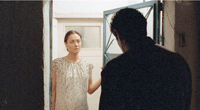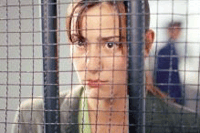 Block-C, 1994. In his essay on the film, critic Gözde Anaran insightfully notes that Zeki Demirkubuz had been an inmate of the Block-C penitentiary after the September 12, 1980 coup d’état. This sense of institutionalization also surfaces in the way Demirkubuz frames the middle class, high-rise residential apartment complex that provide the claustrophobic setting for his first film. Something like an unpolished Michelangelo Antonioni film in its interpenetration of alienating landscapes and interior turmoil, Block-C is a flawed, yet seminal film in Demirkubuz’s body of work – a complex character study that provides the psychological and visceral paradigm for his subsequent films. Using the rapid development of the Ataköy apartments during the 1980s as a reflection of the country’s rapid cultural transformation, Demirkubuz creates a metaphor for the nation’s profound moral transformation in the wake of Turkey’s post 1980 military coup economic liberalization. Told from the perspective of a bored, middle class housewife, Tulay (whose increasing restlessness is initially revealed through the increasing frequency of her aimless road trips around the city, even during at the height of a storm) whose life begins to gradually unravel after she accidentally walks in on her maid Asli and her lover, the building superintendent’s son, Halit one day in an act of intimacy in the apartment, the film also suggests sympathy with the eponymous housewife of Chantal Akerman’s Jeanne Dielman, 23 Quai du Commerce, 1080 Bruxelles in capturing the seemingly liminal perturbations that surface within the heroine’s daily routine that ultimately lead to profound consequences. Also worth noting is that during the subsequent panel discussion, Demirkubuz indicated that Honoré de Balzac was one of the novelists whose works he “discovered” as a result of the 1980 military coup, and the integral theme of stairs as a metaphor for social station in Balzac’s novel, Père Goriot, may also be seen in the recurring imagery of the staircases and elevators that separate the characters in Block-C (albeit in overturned form as a result of technology, where the higher levels now represent the premium spaces), including a running joke involving a hapless deliveryman who is never allowed entry into the secured building.
Block-C, 1994. In his essay on the film, critic Gözde Anaran insightfully notes that Zeki Demirkubuz had been an inmate of the Block-C penitentiary after the September 12, 1980 coup d’état. This sense of institutionalization also surfaces in the way Demirkubuz frames the middle class, high-rise residential apartment complex that provide the claustrophobic setting for his first film. Something like an unpolished Michelangelo Antonioni film in its interpenetration of alienating landscapes and interior turmoil, Block-C is a flawed, yet seminal film in Demirkubuz’s body of work – a complex character study that provides the psychological and visceral paradigm for his subsequent films. Using the rapid development of the Ataköy apartments during the 1980s as a reflection of the country’s rapid cultural transformation, Demirkubuz creates a metaphor for the nation’s profound moral transformation in the wake of Turkey’s post 1980 military coup economic liberalization. Told from the perspective of a bored, middle class housewife, Tulay (whose increasing restlessness is initially revealed through the increasing frequency of her aimless road trips around the city, even during at the height of a storm) whose life begins to gradually unravel after she accidentally walks in on her maid Asli and her lover, the building superintendent’s son, Halit one day in an act of intimacy in the apartment, the film also suggests sympathy with the eponymous housewife of Chantal Akerman’s Jeanne Dielman, 23 Quai du Commerce, 1080 Bruxelles in capturing the seemingly liminal perturbations that surface within the heroine’s daily routine that ultimately lead to profound consequences. Also worth noting is that during the subsequent panel discussion, Demirkubuz indicated that Honoré de Balzac was one of the novelists whose works he “discovered” as a result of the 1980 military coup, and the integral theme of stairs as a metaphor for social station in Balzac’s novel, Père Goriot, may also be seen in the recurring imagery of the staircases and elevators that separate the characters in Block-C (albeit in overturned form as a result of technology, where the higher levels now represent the premium spaces), including a running joke involving a hapless deliveryman who is never allowed entry into the secured building.
 Innocence, 1997. Zeki Demirkubuz’s sophomore feature, Innocence represents a marked stylistic departure from the fragmentation and narrative asymmetry of Block-C and converges towards what would prove to be more quintessential recurring elements within his body of work: long takes, painstaking observation of temps mort, stationary camera framing, the inclusion of a hyper-extended dialogue “ellipses” (or in the case of The Third Page, a monologue) that approaches abstraction, the running television as a surrogate for self-imposed isolation, and a temporal ambiguity that projects an epic scope to intrinsically intimate, chamber dramas. Opening to the shot of a recently paroled prisoner, Yusuf (Güven Kiraç), pleading his case before the warden to remain in jail despite having served out his sentence for murder and attempted murder, arguing that he has lost touch with his sole remaining family (the married sister whom he attempted to kill along with her lover, apparently on behalf of his abusive, but weak willed brother-in-law) and does not have the appropriate support system to survive in the outside world without resorting to crime once again, as the official’s door repeatedly springs open for no apparent reason, the seeming randomness of the broken door (a recurring image in his films) becomes a metaphor for the ambiguity of his future. A strange and fateful encounter with a couple forcibly removed from the bus reinforces this sense of destiny. Arriving at a rundown boarding house in a rural town to rest for the evening, he comes to the aid of a little girl stricken with fever after her parents fail to turn up for the evening to claim her. Returning the next morning to the boarding house after their mysterious disappearance, the parents turn out to be the detained couple from the bus, a genial, but mercurial drifter named Bekir (Haluk Bilginer) and the elusive object of his affection, a wanton lounge singer, Ugur (Derya Alabora) (perhaps a wink to Josef von Sternberg’s The Blue Angel), who has been traveling across the country for twenty years (with Bekir ingratiating himself into her company) to be near her imprisoned first, “true” love. With little hope for reconciliation with his embittered and suffering sister, Yusuf returns for an indefinite stay at the boarding house and embarks on a friendship with the volatile couple. However, as Bekir and Ugur’s relationship continues to be strained by the cumulative toll of their corrosive dysfunction, Yusuf, too, becomes drawn into their seductive, dark world of mutual self-destruction. Evoking the emotional intensity of an Ingmar Bergman chamber film and infused with the idiosyncratic combination of understated humor and soap operatic melodrama (not unlike the television programs that the lodgers watch each evening at the lounge), Innocence is an elegant, remarkably complex, and painstakingly rendered study of destructive obsessions and codependency. But beyond the psychological addiction that defines Bekir and Ugur’s interminable journey to nowhere, Demirkubuz’s framing of their relationship through the perspective of innocents, initially, through Ugur’s deaf mute child, then subsequently, through the well-intentioned (and all too accommodating) Yusuf, Demirkubuz presents an intriguing portrait, not only of a pliable personality, but also the hypocrisy inherent in abusive relationships, where cruelty is rationalized by a sense of helpless, self-entitled victimization.
Innocence, 1997. Zeki Demirkubuz’s sophomore feature, Innocence represents a marked stylistic departure from the fragmentation and narrative asymmetry of Block-C and converges towards what would prove to be more quintessential recurring elements within his body of work: long takes, painstaking observation of temps mort, stationary camera framing, the inclusion of a hyper-extended dialogue “ellipses” (or in the case of The Third Page, a monologue) that approaches abstraction, the running television as a surrogate for self-imposed isolation, and a temporal ambiguity that projects an epic scope to intrinsically intimate, chamber dramas. Opening to the shot of a recently paroled prisoner, Yusuf (Güven Kiraç), pleading his case before the warden to remain in jail despite having served out his sentence for murder and attempted murder, arguing that he has lost touch with his sole remaining family (the married sister whom he attempted to kill along with her lover, apparently on behalf of his abusive, but weak willed brother-in-law) and does not have the appropriate support system to survive in the outside world without resorting to crime once again, as the official’s door repeatedly springs open for no apparent reason, the seeming randomness of the broken door (a recurring image in his films) becomes a metaphor for the ambiguity of his future. A strange and fateful encounter with a couple forcibly removed from the bus reinforces this sense of destiny. Arriving at a rundown boarding house in a rural town to rest for the evening, he comes to the aid of a little girl stricken with fever after her parents fail to turn up for the evening to claim her. Returning the next morning to the boarding house after their mysterious disappearance, the parents turn out to be the detained couple from the bus, a genial, but mercurial drifter named Bekir (Haluk Bilginer) and the elusive object of his affection, a wanton lounge singer, Ugur (Derya Alabora) (perhaps a wink to Josef von Sternberg’s The Blue Angel), who has been traveling across the country for twenty years (with Bekir ingratiating himself into her company) to be near her imprisoned first, “true” love. With little hope for reconciliation with his embittered and suffering sister, Yusuf returns for an indefinite stay at the boarding house and embarks on a friendship with the volatile couple. However, as Bekir and Ugur’s relationship continues to be strained by the cumulative toll of their corrosive dysfunction, Yusuf, too, becomes drawn into their seductive, dark world of mutual self-destruction. Evoking the emotional intensity of an Ingmar Bergman chamber film and infused with the idiosyncratic combination of understated humor and soap operatic melodrama (not unlike the television programs that the lodgers watch each evening at the lounge), Innocence is an elegant, remarkably complex, and painstakingly rendered study of destructive obsessions and codependency. But beyond the psychological addiction that defines Bekir and Ugur’s interminable journey to nowhere, Demirkubuz’s framing of their relationship through the perspective of innocents, initially, through Ugur’s deaf mute child, then subsequently, through the well-intentioned (and all too accommodating) Yusuf, Demirkubuz presents an intriguing portrait, not only of a pliable personality, but also the hypocrisy inherent in abusive relationships, where cruelty is rationalized by a sense of helpless, self-entitled victimization.
 The Third Page, 1999. Like Zeki Demirkubuz’s preceding film, Innocence, his equally elegant third feature, The Third Page also opens to a shot of the film’s central character, in his case, a struggling bit player named Isa (Ruhi Sari) being questioned in a private room as a broken door continues to prop open. At first, the parallel framing suggests an integral similarity between the two characters: Yusuf, a person who has paid for his crime and now returns to society a figurative innocent, and Isa who continues to proclaim his innocence in vain before a brutal mob boss who continues to beat him over the disappearance of fifty dollars from a job that he had recent carried out for him. Given one day to repay the missing money, Yusuf turns to the studio where is being considered for the role of Raskolnikov for a proposed adaptation of Fyodor Dostoevsky’s Crime and Punishment to ask the director for a salary advance and, without success, begins to rifle through the studio offices in his absence to search for a means to raise the money, where he finds a gun stashed in a desk drawer, and resolves to kill himself, only to be interrupted by his landlord who has stopped by to collect back rent. Stricken with physical exhaustion and delirium from his savage beating, Isa’s fortunes seems to turn once again when his abusive landlord turns up dead the next morning, perhaps even by his own hand, and his beautiful neighbor, Meryem (Basak Köklükaya), the neglected and long suffering wife of a drunkard whose work as a migrant laborer often sends him away from home for long periods of time, nurses him back to health. Invigorated by his increasing attraction towards the kind and enigmatic Meryem, Isa begins to find some measure of contentment in his small, but recurring role in a soap opera, a happiness that would prove fleeting when Meryem’s husband returns home and returns to her reclusive silence. Deriving the title from the designated tabloid section of the Turkish press, Zeki Demirkubuz elegantly retains the pulpy and tawdry nature of the human interest stories relegated to this section of the newspaper, even as he compassionately elevates the untold nature of their marginalized lives and suffering into the timeless, classical form of a Dostoevsky moral dilemma. Juxtaposing Isa and Meryem’s seemingly sensationalized, stranger than fiction story against screen test interviews with hungry actors desperate for a part in the latest casting call (including one of Isa who reveals that his dream to play a lead role where he is able to transcend all adversity), Demirkubuz creates a potent and incisive metaphor for all humanity as struggling actors within their own evolving human drama, where personal trajectories are defined as equally by chance as it is conscience, the intricacies of divine fate and convolutions of instinctual, human machination.
The Third Page, 1999. Like Zeki Demirkubuz’s preceding film, Innocence, his equally elegant third feature, The Third Page also opens to a shot of the film’s central character, in his case, a struggling bit player named Isa (Ruhi Sari) being questioned in a private room as a broken door continues to prop open. At first, the parallel framing suggests an integral similarity between the two characters: Yusuf, a person who has paid for his crime and now returns to society a figurative innocent, and Isa who continues to proclaim his innocence in vain before a brutal mob boss who continues to beat him over the disappearance of fifty dollars from a job that he had recent carried out for him. Given one day to repay the missing money, Yusuf turns to the studio where is being considered for the role of Raskolnikov for a proposed adaptation of Fyodor Dostoevsky’s Crime and Punishment to ask the director for a salary advance and, without success, begins to rifle through the studio offices in his absence to search for a means to raise the money, where he finds a gun stashed in a desk drawer, and resolves to kill himself, only to be interrupted by his landlord who has stopped by to collect back rent. Stricken with physical exhaustion and delirium from his savage beating, Isa’s fortunes seems to turn once again when his abusive landlord turns up dead the next morning, perhaps even by his own hand, and his beautiful neighbor, Meryem (Basak Köklükaya), the neglected and long suffering wife of a drunkard whose work as a migrant laborer often sends him away from home for long periods of time, nurses him back to health. Invigorated by his increasing attraction towards the kind and enigmatic Meryem, Isa begins to find some measure of contentment in his small, but recurring role in a soap opera, a happiness that would prove fleeting when Meryem’s husband returns home and returns to her reclusive silence. Deriving the title from the designated tabloid section of the Turkish press, Zeki Demirkubuz elegantly retains the pulpy and tawdry nature of the human interest stories relegated to this section of the newspaper, even as he compassionately elevates the untold nature of their marginalized lives and suffering into the timeless, classical form of a Dostoevsky moral dilemma. Juxtaposing Isa and Meryem’s seemingly sensationalized, stranger than fiction story against screen test interviews with hungry actors desperate for a part in the latest casting call (including one of Isa who reveals that his dream to play a lead role where he is able to transcend all adversity), Demirkubuz creates a potent and incisive metaphor for all humanity as struggling actors within their own evolving human drama, where personal trajectories are defined as equally by chance as it is conscience, the intricacies of divine fate and convolutions of instinctual, human machination.
 The Confession, 2001. One of the highlights from the Zeki Demirkubuz retrospective for me was the discovery of The Confession, the second installment of his Tales of Darkness trilogy, a taut, minimalist, and deeply moving portrait of the dissolution of a marriage. A pair of mundane, quick greeting calls to the office for public works engineer, Harun (Taner Birsel) made by his wife, Nilgün (Basak Köklükaya) incisively frames the state of their disintegrating marriage, as the empty conversations and extended silences (and implicit reassurances) give way to a sense of anxiety that becomes even more profound when Harun, once again, goes away on business. Returning earlier than planned, Harun’s suspicions grow deeper when he overhears his wife place a call to confirm her safe arrival home after apparently having spent the evening away from home. Increasingly convinced of his wife’s infidelity, Harun goads her into meeting for a seemingly casual dinner out (and perhaps signaling an implicit pretext of agreeing to her past entreaties for a trial separation) and confronts her with his nagging suspicions, offering to consent to the separation on that condition that she confess her infidelity and confirm her culpability – an attempt to deflect his own sense of displaced guilt that had been sown years earlier following the suicide of his best friend (a death that may have been precipitated by their rivalry over Nilgün’s affections). However, as Nilgün steadfastly continues to refuse to acknowledge her guilt and enable her husband’s own consuming fears even in the face of escalating physical violence, the possibility for closure over Harun’s own harbored wounds and implacable conscience soon proves even more elusive. Demirkubuz’s elegant primary compositions of medium shots from a stationary camera, confining interior spaces, and near real-time progression provide an incisive backdrop that mirrors the raw and unflinching intimacy of the film’s psychologically dark emotional terrain, creating a haunting metaphor for humanity’s Nietszchian eternal struggle between (Apollinian) logic and (Dionysian) passion.
The Confession, 2001. One of the highlights from the Zeki Demirkubuz retrospective for me was the discovery of The Confession, the second installment of his Tales of Darkness trilogy, a taut, minimalist, and deeply moving portrait of the dissolution of a marriage. A pair of mundane, quick greeting calls to the office for public works engineer, Harun (Taner Birsel) made by his wife, Nilgün (Basak Köklükaya) incisively frames the state of their disintegrating marriage, as the empty conversations and extended silences (and implicit reassurances) give way to a sense of anxiety that becomes even more profound when Harun, once again, goes away on business. Returning earlier than planned, Harun’s suspicions grow deeper when he overhears his wife place a call to confirm her safe arrival home after apparently having spent the evening away from home. Increasingly convinced of his wife’s infidelity, Harun goads her into meeting for a seemingly casual dinner out (and perhaps signaling an implicit pretext of agreeing to her past entreaties for a trial separation) and confronts her with his nagging suspicions, offering to consent to the separation on that condition that she confess her infidelity and confirm her culpability – an attempt to deflect his own sense of displaced guilt that had been sown years earlier following the suicide of his best friend (a death that may have been precipitated by their rivalry over Nilgün’s affections). However, as Nilgün steadfastly continues to refuse to acknowledge her guilt and enable her husband’s own consuming fears even in the face of escalating physical violence, the possibility for closure over Harun’s own harbored wounds and implacable conscience soon proves even more elusive. Demirkubuz’s elegant primary compositions of medium shots from a stationary camera, confining interior spaces, and near real-time progression provide an incisive backdrop that mirrors the raw and unflinching intimacy of the film’s psychologically dark emotional terrain, creating a haunting metaphor for humanity’s Nietszchian eternal struggle between (Apollinian) logic and (Dionysian) passion.
 Fate, 2001. The first installment of Zeki Demirkubuz’s Tales of Darkness trilogy (which would subsequently include The Confession and The Waiting Room), Fate is perhaps his most fully realized adoption of themes inspired by his literary influences (and self-acknowledged personal favorite among his films to date), in this case, Albert Camus’s widely read, existentialist fiction, The Stranger. Fusing the essentiality of actors’ faces that characterize Robert Bresson’s cinema with the acute, muted humor of Darezhan Omirbaev (and on occasion, upending it, as in the case of an initially Kaïrat-like innocent encounter at a movie theater that soon escalates into awkward groping), Fate chronicles the strange turn of events in the life of a seductive, accommodating, and enigmatic junior customs clerk named Musa (Serder Orçin) who lives alone with his mother at a low rent apartment in Istabul following her death one day from natural causes. Proceeding to go to work on the (apparent) morning of his mother’s death – and even working overtime – despite a nagging suspicion that something was amiss after she stayed in bed without preparing his customary breakfast (as well as failing to heed his well-intentioned coworkers’ advice to check in on her at lunch time), his strange behavior would soon fall into scrutiny after he comes to the aid of his neighbor after he runs afoul with his mistress’s brothers, and acquiesces to a marriage with his attractive colleague who had been carrying out a clandestine affair with their philandering, married boss. As equally bracing in its moral ambiguity as it is wryly comical in the young antihero’s complacent resignation to the misaligning forces of his manipulated (and to a certain extent, self-inflicted) “fate”, the film is also a probing cautionary tale of soullessness and the folly of sentimental inertia that is borne of one’s complete submission to the will of external forces. It is in this respect that Demirkubuz’s dark and unconventional vision remains both culturally specific and universally relevant, a scathing indictment of kismet as a scapegoat for personal accountability, and an accepted pathology to the social malady of urban alienation.
Fate, 2001. The first installment of Zeki Demirkubuz’s Tales of Darkness trilogy (which would subsequently include The Confession and The Waiting Room), Fate is perhaps his most fully realized adoption of themes inspired by his literary influences (and self-acknowledged personal favorite among his films to date), in this case, Albert Camus’s widely read, existentialist fiction, The Stranger. Fusing the essentiality of actors’ faces that characterize Robert Bresson’s cinema with the acute, muted humor of Darezhan Omirbaev (and on occasion, upending it, as in the case of an initially Kaïrat-like innocent encounter at a movie theater that soon escalates into awkward groping), Fate chronicles the strange turn of events in the life of a seductive, accommodating, and enigmatic junior customs clerk named Musa (Serder Orçin) who lives alone with his mother at a low rent apartment in Istabul following her death one day from natural causes. Proceeding to go to work on the (apparent) morning of his mother’s death – and even working overtime – despite a nagging suspicion that something was amiss after she stayed in bed without preparing his customary breakfast (as well as failing to heed his well-intentioned coworkers’ advice to check in on her at lunch time), his strange behavior would soon fall into scrutiny after he comes to the aid of his neighbor after he runs afoul with his mistress’s brothers, and acquiesces to a marriage with his attractive colleague who had been carrying out a clandestine affair with their philandering, married boss. As equally bracing in its moral ambiguity as it is wryly comical in the young antihero’s complacent resignation to the misaligning forces of his manipulated (and to a certain extent, self-inflicted) “fate”, the film is also a probing cautionary tale of soullessness and the folly of sentimental inertia that is borne of one’s complete submission to the will of external forces. It is in this respect that Demirkubuz’s dark and unconventional vision remains both culturally specific and universally relevant, a scathing indictment of kismet as a scapegoat for personal accountability, and an accepted pathology to the social malady of urban alienation.
 The Waiting Room, 2004. During the panel discussion on Turkish cinema, Zeki Demirkubuz cited Friedrich Nietzsche’s (paraphrased) statement that the more a person understands the world around him, the more isolated he becomes. This sentiment also seems to form the creative ideal for the fictional director, Ahmet (played by Demirkubuz himself) in the Waiting Room, the final installment of the Tales of Darkness trilogy. In a sense, the film is also a paradigm for Nuri Bilge Ceylan’s Distant (and to a lesser degree, Climates in the casting of his real-life wife as his fictionally estranged one) in its exploration of the paradoxical role of the filmmaker as both a neutral spectator and an integrally rooted actor in the inspiration for – as well as the creation of – his art. Representing Demirkubuz’s cinema at its most personal, but also at its most abstract, the film is a slice of life portrait of an independent filmmaker struggling to pull together his long harbored ambition of adapting Fyodor Dostoevsky’s Crime and Punishment into film (an idea not unlike one Demirkubuz envisions undertaking himself, having previously expressed his desire to make an adaptation of the novel, but not yet having found an actor who coincides with his vision to play the lead role and move forward with the project) against the everyday (and largely intentional) distractions within his personal life. A humorous early encounter with a trapped young burglar, Ferit (Ufuk Bayraktar) who had sprained his ankle while climbing a security wall in an attempt to break into Ahmed’s apartment complex – and who is then forced to rely on his intended victim’s cooperation to allow him to “escape”, hobbling, through the front door – introduces the theme of moral resignation as complicity, a figurative “innocence”, that runs through the film. Acquiescing to his wife’s demands that he admit to a nonexistent affair (perhaps in order to assuage her own conscience for deciding to leave him), the newly separated (and consequently, emotionally isolated) Ahmed decides to restart the project with his assistant, Serap (Nilüfer Açikalin) after becoming increasingly convinced that Ferit would be ideal in the role of Raskolnikov. But as new emotional attachments and complications again begin to surface in Ahmed’s life – including the appearance of Serap’s lover, Kerem (Serder Orçin), who confronts him on the suspicion that Serap has confused his aloofness as a sign of seduction – real life once again reasserts itself into his (proposed) fiction and upends the dynamics of his untenable creative process. Ironically, while the film suggests alignment with Abbas Kiarostami’s cinema (most notably, in the Koker trilogy) in its observations of interpenetrating realities, the fictional director’s creative process implies its antithesis. Rather than a search for beauty by immersing in the mundane reality of everyday life, Ahmed seeks to disengage from the quotidian, to withdraw from its distractions, in order to create fiction (an affectation that is also reflected in his disinterest in finding his cat after her kittens have adopted a box on his balcony as their new home). However, it is this elusiveness of creative isolation – the impossibility of truly inhabiting another artist’s work – that would prove to be his epiphany as well, a realization that the information of reality resides in the essence of fiction.
The Waiting Room, 2004. During the panel discussion on Turkish cinema, Zeki Demirkubuz cited Friedrich Nietzsche’s (paraphrased) statement that the more a person understands the world around him, the more isolated he becomes. This sentiment also seems to form the creative ideal for the fictional director, Ahmet (played by Demirkubuz himself) in the Waiting Room, the final installment of the Tales of Darkness trilogy. In a sense, the film is also a paradigm for Nuri Bilge Ceylan’s Distant (and to a lesser degree, Climates in the casting of his real-life wife as his fictionally estranged one) in its exploration of the paradoxical role of the filmmaker as both a neutral spectator and an integrally rooted actor in the inspiration for – as well as the creation of – his art. Representing Demirkubuz’s cinema at its most personal, but also at its most abstract, the film is a slice of life portrait of an independent filmmaker struggling to pull together his long harbored ambition of adapting Fyodor Dostoevsky’s Crime and Punishment into film (an idea not unlike one Demirkubuz envisions undertaking himself, having previously expressed his desire to make an adaptation of the novel, but not yet having found an actor who coincides with his vision to play the lead role and move forward with the project) against the everyday (and largely intentional) distractions within his personal life. A humorous early encounter with a trapped young burglar, Ferit (Ufuk Bayraktar) who had sprained his ankle while climbing a security wall in an attempt to break into Ahmed’s apartment complex – and who is then forced to rely on his intended victim’s cooperation to allow him to “escape”, hobbling, through the front door – introduces the theme of moral resignation as complicity, a figurative “innocence”, that runs through the film. Acquiescing to his wife’s demands that he admit to a nonexistent affair (perhaps in order to assuage her own conscience for deciding to leave him), the newly separated (and consequently, emotionally isolated) Ahmed decides to restart the project with his assistant, Serap (Nilüfer Açikalin) after becoming increasingly convinced that Ferit would be ideal in the role of Raskolnikov. But as new emotional attachments and complications again begin to surface in Ahmed’s life – including the appearance of Serap’s lover, Kerem (Serder Orçin), who confronts him on the suspicion that Serap has confused his aloofness as a sign of seduction – real life once again reasserts itself into his (proposed) fiction and upends the dynamics of his untenable creative process. Ironically, while the film suggests alignment with Abbas Kiarostami’s cinema (most notably, in the Koker trilogy) in its observations of interpenetrating realities, the fictional director’s creative process implies its antithesis. Rather than a search for beauty by immersing in the mundane reality of everyday life, Ahmed seeks to disengage from the quotidian, to withdraw from its distractions, in order to create fiction (an affectation that is also reflected in his disinterest in finding his cat after her kittens have adopted a box on his balcony as their new home). However, it is this elusiveness of creative isolation – the impossibility of truly inhabiting another artist’s work – that would prove to be his epiphany as well, a realization that the information of reality resides in the essence of fiction.
 Destiny, 2006. My final screening in the retrospective is also coincidentally Zeki Demirkubuz’s latest feature, Destiny, a brooding and elegantly rendered film that takes on an even richer texture within the context of the creative evolution (and maturation) of his body of work. The story of Destiny proves to be an already familiar one: a shy, but affable rug salesman, Bekir (Ufuk Bayraktar) a son from a wealthy family falls in love with a beautiful, but troubled young woman, Ugur (Vildan Atasever) who, in turn, is in love with an unrepentant neighborhood thug named Zagor. In an attempt to remain close to her jailed lover, Ugur abandons her family in Istanbul and begins her life as a drifter, settling in a town near Zagor’s prison where she finds occasional work as a lounge singer (or more appropriately, peddling her sexuality), until circumstances (often, of Zagor’s own doing) forces his relocation into another facility, and with it, her own abrupt move to again be near him. And through it all, Bekir, now having lost his job and bankrupted the family business that had been entrusted to him by consenting to financially support Ugur in her impossible pursuit to secure her lover’s freedom, obligingly, if reluctantly, follows her to the new town on his own personal journey to nowhere. It is the extended monologue that the middle-aged Bekir would reveal to Yusuf seemingly some twenty years later in Demirkubuz’s earlier film, Innocence, the sad autobiography of how he has squandered his life over the past two decades to be near the object of his unrequited love. In a way, the intersection of these stories is also a destiny – Bekir and Ugur’s double entendred return to the innocence and purity of first love. However, Demirkubuz’s tale is a dislocated purity, one that exists not only in the absolute, but also in the absence of a moral center. In this sense, the couple’s shared, yet isolating obsession is the embodiment of a Sisyphean ritual for which, as Albert Camus’s essay, The Myth of Sisyphus suggests, the struggle itself is an act of conscious defiance and becomes ennobling. Framed against the atemporality of Bekir and Ugur’s quixotic, if self-destructive existence, the absurdity of their resolute, yet elusive eternal quest itself becomes a paradox, where transcendence lies, not in the pursuit of destiny, but in the struggle against it.
Destiny, 2006. My final screening in the retrospective is also coincidentally Zeki Demirkubuz’s latest feature, Destiny, a brooding and elegantly rendered film that takes on an even richer texture within the context of the creative evolution (and maturation) of his body of work. The story of Destiny proves to be an already familiar one: a shy, but affable rug salesman, Bekir (Ufuk Bayraktar) a son from a wealthy family falls in love with a beautiful, but troubled young woman, Ugur (Vildan Atasever) who, in turn, is in love with an unrepentant neighborhood thug named Zagor. In an attempt to remain close to her jailed lover, Ugur abandons her family in Istanbul and begins her life as a drifter, settling in a town near Zagor’s prison where she finds occasional work as a lounge singer (or more appropriately, peddling her sexuality), until circumstances (often, of Zagor’s own doing) forces his relocation into another facility, and with it, her own abrupt move to again be near him. And through it all, Bekir, now having lost his job and bankrupted the family business that had been entrusted to him by consenting to financially support Ugur in her impossible pursuit to secure her lover’s freedom, obligingly, if reluctantly, follows her to the new town on his own personal journey to nowhere. It is the extended monologue that the middle-aged Bekir would reveal to Yusuf seemingly some twenty years later in Demirkubuz’s earlier film, Innocence, the sad autobiography of how he has squandered his life over the past two decades to be near the object of his unrequited love. In a way, the intersection of these stories is also a destiny – Bekir and Ugur’s double entendred return to the innocence and purity of first love. However, Demirkubuz’s tale is a dislocated purity, one that exists not only in the absolute, but also in the absence of a moral center. In this sense, the couple’s shared, yet isolating obsession is the embodiment of a Sisyphean ritual for which, as Albert Camus’s essay, The Myth of Sisyphus suggests, the struggle itself is an act of conscious defiance and becomes ennobling. Framed against the atemporality of Bekir and Ugur’s quixotic, if self-destructive existence, the absurdity of their resolute, yet elusive eternal quest itself becomes a paradox, where transcendence lies, not in the pursuit of destiny, but in the struggle against it.
Acquarello, 2007 [reprinted]